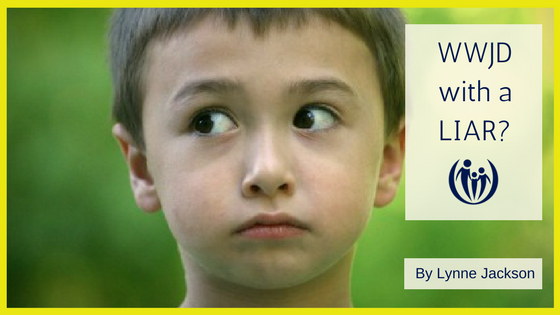
WWJD… with a Liar?
You notice the slight nervousness as your child answers, somewhat evasively. You have that parental intuition that he is lying to you, and as you check out the facts, you find that you’re right. You feel angry, hurt, discouraged, and confused about what to do. You give consequences, just like the last time, but the lying continues. It may even be getting worse.
Parents’ approach to dishonesty is often a catch-and-punish approach. This can breed resentment, disconnection, and more lies. Today I invite you to consider a different approach – the approach Jesus used when Peter lied.
Remember, the goal of any dealing with misbehavior is to help a child experience natural impacts, and to encourage more honoring future actions. Regarding lying, the goal is not to assure that kids don’t lie but to build in them a value for honesty.
The below activity will help you have a meaningful discussion with your kids about lying and honesty.
Jesus, Peter, and the Value of Honesty
At dinner or some other relaxed time ask your family: “What would you do when a person close to you blatantly lied to get out of trouble – several times in a row?” Let kids talk about lies and do your best to guide them to think about the natural impacts of lying – mistrust, hurt feelings, lost friends, and so on. When your kids have had a chance to answer, throw in your ideas as well (of what you thought of before you read this tip).
Peter’s big promise
Read John 13:33-38. Here Jesus predicts his death and Peter strongly affirms his promise to “lay down his life” for Jesus. Jesus then warns that Peter will deny Christ.
Peter’s big lies
Read Luke 22:54-62. Jesus has just been betrayed by Judas. In the chaos surrounding Jesus’ arrest, Peter follows Jesus but tries to go unnoticed. Three times he is questioned. Three times he lies.
→ ASK KIDS: Why did Peter weep after Jesus looked at him? Why didn’t Jesus scold Peter? What was it like to be Peter after that?
Jesus’ big Grace!
Read John 22:15-17. This is the first recorded interaction between Peter and Jesus after Peter’s big lies. Jesus had been crucified and was risen from the dead, before ascending to heaven. Some Bible teachers say this is “Peter’s reinstatement”, meaning that this was how Jesus dealt with Peter’s lies.
→ ASK KIDS: This is very different than how most people deal with someone who has lied. Why do you think Jesus did that? What does love have to do with lying? What did Peter believe about himself after Jesus responded that way? (Answers could include that he was loved no matter what, he was forgiven, that Jesus trusted him with a very important job.)
Do you think Peter was more likely to lie again or less likely to lie again after that? Why?
Let kids know the end of the story – from that time on Peter was a faithful, courageous disciple – no more lies. He was the leader of the all the Jewish people who believed in Christ and cared for them faithfully. Eventually, he was killed because he refused to deny his faith in Jesus!
It is our belief that perfect love can cast out the fear that drives most lies. When grace invades, the value for truth grows. Consider Jesus’ response as the example for responding to anyone in your family who tells a lie.
Apply It Now:
- Remind yhrmthey are loved no matter what
- Remind them they have an important calling in life, including close, trusting relationships
- Help them make a plan to restore the relationship that was hurt by the lie, by connecting and/or serving in some way.
Want help implementing these principles with your family? Check out our coaching options!
Frustrated by constant discipline challenges? Take 15 minutes to read our free ebook 4 Messages All Children Long to Hear: A Discipline That Connects Overview.







